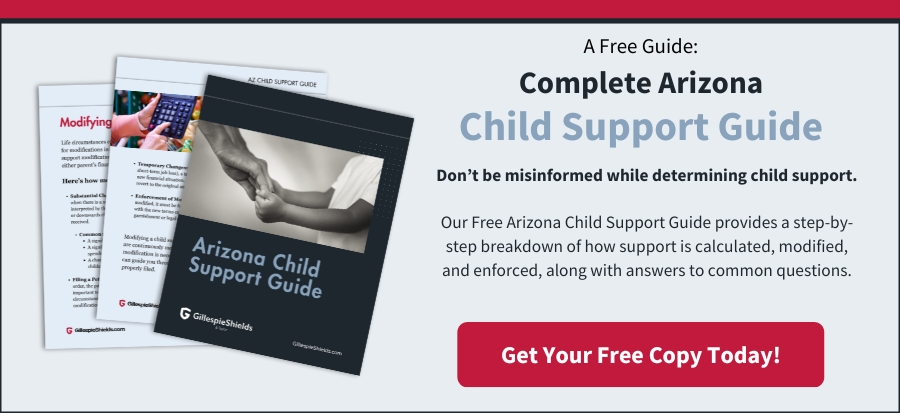 When a couple shares a child and separates, both parents have a legal duty to ensure the child has the resources necessary to grow and thrive. In Arizona, parents who do not hold primary custody must provide regular payments to uphold their share of this burden. These payments, termed child support payments, are a legal requirement to fund necessities such as food, clothing, medical expenses, education expenses, and more. Child support payments are ordered by the Arizona Family Court according to a formula created by the state, regulated by the Arizona Division of Child Support Services (DCSS), and can be enforced by the court or the Arizona Department of Economic Security. While this system was developed to ensure fair payments that consider the financial circumstances of the parents and ensure the benefit of the child, child support laws can be cumbersome and complicated. As a result, many parents become overwhelmed when facing the prospect of determining regular payments that must provide for their child’s welfare over a number of years. Whether you are a parent receiving payments or making them, child support ensures that both parents are meeting the needs of the child. The dedicated child support attorneys at Gillespie, Shields & Taylor are committed to empowering Arizona parents within the child support process. This guide can help you understand the most important aspects of child support in the state.
When a couple shares a child and separates, both parents have a legal duty to ensure the child has the resources necessary to grow and thrive. In Arizona, parents who do not hold primary custody must provide regular payments to uphold their share of this burden. These payments, termed child support payments, are a legal requirement to fund necessities such as food, clothing, medical expenses, education expenses, and more. Child support payments are ordered by the Arizona Family Court according to a formula created by the state, regulated by the Arizona Division of Child Support Services (DCSS), and can be enforced by the court or the Arizona Department of Economic Security. While this system was developed to ensure fair payments that consider the financial circumstances of the parents and ensure the benefit of the child, child support laws can be cumbersome and complicated. As a result, many parents become overwhelmed when facing the prospect of determining regular payments that must provide for their child’s welfare over a number of years. Whether you are a parent receiving payments or making them, child support ensures that both parents are meeting the needs of the child. The dedicated child support attorneys at Gillespie, Shields & Taylor are committed to empowering Arizona parents within the child support process. This guide can help you understand the most important aspects of child support in the state.

Child Support Basics in AZ
Child support is a legally mandated payment one parent is obligated to pay another parent to meet their shared child’s needs. Often, child support orders are established at the time a married couple finalizes their divorce and is approved by the family court; however, the process can be completed at the time of separation or between parents who have never been married. If child support is not ordered as part of a divorce decree, motions can be filed with the Division of Child Support Services. This agency then notifies the other parent that a case has been opened. The process is the same for parents who are seeking child support modifications.
Arizona Child Support Documents
When a child support case begins, the court and DCSS will require parents to submit a litany of documentation and information that is taken into consideration to determine whether child support is necessary, who should pay child support, and a child support amount. When both parties are involved and willing to share information, this process can move quickly. If either party is unwilling to provide the information necessary, the case will be referred to the Office of the Assistant Attorney General, which will begin the legal proceeding through a court. Documents that are often required in an Arizona child support case include:
- Birth certificate of the child
- Any existing child support orders
- Any copies of a marriage license or divorce settlement
- The social security numbers of both parents
- Any test results that establish paternity
- Any adoption records
This information and other requested information will help establish that both parents are legally obligated to support the child. Once this information has been presented and verified, parents will be required to provide financial information to the determining entity. Calculating child support payments can be complicated, because they are subject to the Child Support Guidelines as well as the discretion of the determining entity.
Although there are several estimators available designed to approximate the the final amount is subject to consideration of the following:
- The gross income of both parents
- The amount of parenting time and visitation time both parents are awarded
- The amount of medical expenses the child may need now or in the future and the contribution of each parent already put toward that expense
- If either parent provides child support for any other children
- Any tax benefits that either parent receives
- If the parents live more than 100 miles away, any expenses related to travel in order to visit the child.
- The number of supported children the parents share
There is a misconception that just because one parent makes more than the other, they will be required to pay support. However, that is not always true. The determination depends on all the factors above to ensure that both parents share the responsibility of providing for the needs of the child.
Arizona Child Support Laws
 The Arizona Revised Statutes 25-320 outline the requirements provided by the state regarding child support. Under these statutes, it is determined that:
The Arizona Revised Statutes 25-320 outline the requirements provided by the state regarding child support. Under these statutes, it is determined that:
- Both parents are obligated to financially provide for the child regardless of any marital misconduct that may have occurred.
- The amount to be paid, the retroactive date, and the way in which the support is to be paid are determined by the child support mandate and are legally enforceable. Each should take into account any previously paid support, whether mandatory or voluntary.
- The Supreme Court of Arizona is responsible for determining the guidelines for which support is to be determined and should take into account parental income, the financial resources available to each parent, the standard of living already enjoyed by the child, any physical or emotional needs of the child, and more.
- A parent can receive support for a child beyond 18 if the child has special needs that began before the age of 18 if the child is still in high school or in an equivalency program, and other circumstances.
These are a few of the basic laws outlined by the state government. Once support has been determined, it will be legally enforceable by the Division of Child Support Services. Through DCSS, parents can request enforcement of past-due payments as well as modifications to existing orders.
Arizona Child Support FAQs
Whether you are faced with paying or collecting child support in Arizona, or you would like to seek a modification to your current child support order, you likely have many questions before you begin. With accurate answers from the child support attorneys at Gillespie, Shields & Taylor, you can face the process with confidence and navigate it more smoothly. Here are answers to some of the most common questions about child support.
How Does Arizona Calculate Child Support?
Child support in Arizona is calculated using a variety of information provided by the parents. Arizona will assess each parent’s access to financial resources, the combined income of both parents, the expenses needed to support the child, and more. There are several ways to estimate the amount of support you may be required to pay or that you may receive. The most common way to estimate support payments is with a
Child Support Payment Calculator. While calculating an estimate is important for information purposes, working with an attorney can help provide a clearer understanding of what child support orders might look like for you and your child. There are several contributing factors that are difficult to estimate, such as parenting time or extraordinary expenses, and a child support attorney can help you anticipate your child support order.
What Is Considered Income for Child Support in Arizona?

Income considered to determine child support in Arizona can come from a variety of sources, including earned income, unearned income, imputed income, and other sources. Earned income is received through employment, whether wages, tips, salary, self-employment, or more. Unearned income is any income earned from investments, rent collected on owned properties, unemployment benefits, social security income, and more. Imputed income is your earning potential determined by a court, and can become a factor if there is a belief that one parent may be intentionally unemployed or taking a lower salary in an effort to avoid paying child support. Other income may include disability payments, military benefits, and even spousal support received from another relationship. All of these incomes become a part of the equation in determining the amount of support that a parent may be required to pay. This income is then used in comparison to the total expenses required to provide for the child, including medical costs, education costs, accepted standard of living, and more.
What Is the Maximum Child Support Withholding in Arizona?
In Arizona, you may choose to have monthly child support withheld from an employee’s check. While this is not required, it may be ordered if you are behind on payments or have not met your obligation to pay. If you receive an order for a child support withholding (garnishment), you are required to begin withholding within the first pay period not exceeding 14 days from the date of the order. If the court or the Department of Economic Security orders a child support withholding, it supersedes all other legal obligations. Under these orders, up to 50% of disposable earnings can be withheld. In addition to this withholding, employers could also charge the employee $1 per pay period for the transaction. Once the order is in effect and the withholding begins, employers are obligated to continue doing so until the Division of Child Support Services directly informs them to modify or terminate the withholding. Any adjustments without this official notice could penalize the employer. Child support withholdings are taken before any other deductions or tax payments.
How Long Does a Parent Have To Pay Child Support in Arizona?
Child support payments in Arizona are paid until the last day of the month in which the child turns 18. However, this could be extended under a variety of circumstances. For example, if the child is 18 but still enrolled in high school or in an equivalency program, payments could continue until they graduate high school or on their nineteenth birthday. In some cases, support will continue if medical or other care needs arose prior to the end of what would otherwise be normal payments. This can include physical or mental disabilities requiring ongoing care from the parents. Arizona does allow parents to file motions for early termination or modifications to support as the circumstances and needs of the child change. In some instances, a parent’s ability to support the child increases or decreases, a parent may remarry, or other circumstances may influence the availability of financial resources for the child.
Do You Have To Pay Child Support If You Have 50/50 Custody in Arizona?

Child support laws in Arizona were created with the intent to ensure the financial support of childrens’ needs. For that reason, while 50/50 custody may appear to negate the need for child support, that is not always the case. In some instances, parents can share custody, but one parent may still be legally obligated to help support the other parent with expenses for the child. Income, standard of living, and other factors may influence the calculations and conclude that support is still necessary for things such as daycare, medical expenses, and travel.
What Is the Lowest Child Support Payment?
The amount you may be obligated to pay in child support is determined by a number of factors, which could mean what you pay may look different from that of another person who may make the same as you. Because there are a variety of factors involved, determining a minimum child support payment in Arizona is not an exact science. Because of the complexities involved with determining child support, it is crucial to secure the services of an attorney who can help you better understand what your child support payments may look like. These are just a few of the
many questions you may have about child support in Arizona. While it can be complicated, finding the answers to your questions from a knowledgeable and experienced attorney can help you feel supported throughout the process.
Family Law Attorneys You Can Trust
 Child support payments can create uncertainty for both parents, regardless of whether they will be paying or receiving. However, child support payments are structured to ensure that both parents continue to meet their obligations to the children they have created, even after their relationship with the child’s other parent ends. The lasting result is the provision of essential resources children need to grow and thrive. Whether you have questions about child support, are seeking modifications to an existing support order, or are facing a divorce with children involved, the help of a qualified family law and child support attorney is an essential tool as you proceed. A family law attorney you can trust can help you ensure your child support payments are fair, adequate, and received on time. The family law team at Gillespie, Shields & Taylor has the knowledge and experience you need to continue providing for your child in the years to come. Contact us today to request a consultation. * Editor’s Note: This article was originally published Apr 24, 2022 and has been updated September 3, 2024.
Child support payments can create uncertainty for both parents, regardless of whether they will be paying or receiving. However, child support payments are structured to ensure that both parents continue to meet their obligations to the children they have created, even after their relationship with the child’s other parent ends. The lasting result is the provision of essential resources children need to grow and thrive. Whether you have questions about child support, are seeking modifications to an existing support order, or are facing a divorce with children involved, the help of a qualified family law and child support attorney is an essential tool as you proceed. A family law attorney you can trust can help you ensure your child support payments are fair, adequate, and received on time. The family law team at Gillespie, Shields & Taylor has the knowledge and experience you need to continue providing for your child in the years to come. Contact us today to request a consultation. * Editor’s Note: This article was originally published Apr 24, 2022 and has been updated September 3, 2024.
Family Law Attorney in Phoenix & Mesa
Founded in 1985, GillespieShields is the top family law firm in Phoenix & Mesa. We’re ready to put our years of experience to work to resolve your legal issue.
Request a Consultation
 When a couple shares a child and separates, both parents have a legal duty to ensure the child has the resources necessary to grow and thrive. In Arizona, parents who do not hold primary custody must provide regular payments to uphold their share of this burden. These payments, termed child support payments, are a legal requirement to fund necessities such as food, clothing, medical expenses, education expenses, and more. Child support payments are ordered by the Arizona Family Court according to a formula created by the state, regulated by the Arizona Division of Child Support Services (DCSS), and can be enforced by the court or the Arizona Department of Economic Security. While this system was developed to ensure fair payments that consider the financial circumstances of the parents and ensure the benefit of the child, child support laws can be cumbersome and complicated. As a result, many parents become overwhelmed when facing the prospect of determining regular payments that must provide for their child’s welfare over a number of years. Whether you are a parent receiving payments or making them, child support ensures that both parents are meeting the needs of the child. The dedicated child support attorneys at Gillespie, Shields & Taylor are committed to empowering Arizona parents within the child support process. This guide can help you understand the most important aspects of child support in the state.
When a couple shares a child and separates, both parents have a legal duty to ensure the child has the resources necessary to grow and thrive. In Arizona, parents who do not hold primary custody must provide regular payments to uphold their share of this burden. These payments, termed child support payments, are a legal requirement to fund necessities such as food, clothing, medical expenses, education expenses, and more. Child support payments are ordered by the Arizona Family Court according to a formula created by the state, regulated by the Arizona Division of Child Support Services (DCSS), and can be enforced by the court or the Arizona Department of Economic Security. While this system was developed to ensure fair payments that consider the financial circumstances of the parents and ensure the benefit of the child, child support laws can be cumbersome and complicated. As a result, many parents become overwhelmed when facing the prospect of determining regular payments that must provide for their child’s welfare over a number of years. Whether you are a parent receiving payments or making them, child support ensures that both parents are meeting the needs of the child. The dedicated child support attorneys at Gillespie, Shields & Taylor are committed to empowering Arizona parents within the child support process. This guide can help you understand the most important aspects of child support in the state. The Arizona Revised Statutes 25-320 outline the requirements provided by the state regarding child support. Under these statutes, it is determined that:
The Arizona Revised Statutes 25-320 outline the requirements provided by the state regarding child support. Under these statutes, it is determined that:  Child support payments can create uncertainty for both parents, regardless of whether they will be paying or receiving. However, child support payments are structured to ensure that both parents continue to meet their obligations to the children they have created, even after their relationship with the child’s other parent ends. The lasting result is the provision of essential resources children need to grow and thrive. Whether you have questions about child support, are seeking modifications to an existing support order, or are facing a divorce with children involved, the help of a qualified family law and child support attorney is an essential tool as you proceed. A family law attorney you can trust can help you ensure your child support payments are fair, adequate, and received on time. The family law team at Gillespie, Shields & Taylor has the knowledge and experience you need to continue providing for your child in the years to come. Contact us today to request a consultation. * Editor’s Note: This article was originally published Apr 24, 2022 and has been updated September 3, 2024.
Child support payments can create uncertainty for both parents, regardless of whether they will be paying or receiving. However, child support payments are structured to ensure that both parents continue to meet their obligations to the children they have created, even after their relationship with the child’s other parent ends. The lasting result is the provision of essential resources children need to grow and thrive. Whether you have questions about child support, are seeking modifications to an existing support order, or are facing a divorce with children involved, the help of a qualified family law and child support attorney is an essential tool as you proceed. A family law attorney you can trust can help you ensure your child support payments are fair, adequate, and received on time. The family law team at Gillespie, Shields & Taylor has the knowledge and experience you need to continue providing for your child in the years to come. Contact us today to request a consultation. * Editor’s Note: This article was originally published Apr 24, 2022 and has been updated September 3, 2024.

 Income considered to determine child support in Arizona can come from a variety of sources, including earned income, unearned income, imputed income, and other sources. Earned income is received through employment, whether wages, tips, salary, self-employment, or more. Unearned income is any income earned from investments, rent collected on owned properties, unemployment benefits, social security income, and more. Imputed income is your earning potential determined by a court, and can become a factor if there is a belief that one parent may be intentionally unemployed or taking a lower salary in an effort to avoid paying child support. Other income may include disability payments, military benefits, and even spousal support received from another relationship. All of these incomes become a part of the equation in determining the amount of support that a parent may be required to pay. This income is then used in comparison to the total expenses required to provide for the child, including medical costs, education costs, accepted standard of living, and more.
Income considered to determine child support in Arizona can come from a variety of sources, including earned income, unearned income, imputed income, and other sources. Earned income is received through employment, whether wages, tips, salary, self-employment, or more. Unearned income is any income earned from investments, rent collected on owned properties, unemployment benefits, social security income, and more. Imputed income is your earning potential determined by a court, and can become a factor if there is a belief that one parent may be intentionally unemployed or taking a lower salary in an effort to avoid paying child support. Other income may include disability payments, military benefits, and even spousal support received from another relationship. All of these incomes become a part of the equation in determining the amount of support that a parent may be required to pay. This income is then used in comparison to the total expenses required to provide for the child, including medical costs, education costs, accepted standard of living, and more.  Child support laws in Arizona were created with the intent to ensure the financial support of childrens’ needs. For that reason, while 50/50 custody may appear to negate the need for child support, that is not always the case. In some instances, parents can share custody, but one parent may still be legally obligated to help support the other parent with expenses for the child. Income, standard of living, and other factors may influence the calculations and conclude that support is still necessary for things such as daycare, medical expenses, and travel.
Child support laws in Arizona were created with the intent to ensure the financial support of childrens’ needs. For that reason, while 50/50 custody may appear to negate the need for child support, that is not always the case. In some instances, parents can share custody, but one parent may still be legally obligated to help support the other parent with expenses for the child. Income, standard of living, and other factors may influence the calculations and conclude that support is still necessary for things such as daycare, medical expenses, and travel.